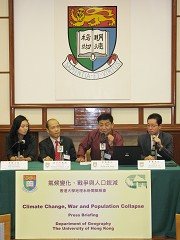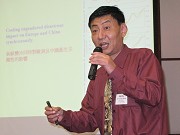Media
Global Climate Change Could Lead to War and Population Collapse
21 Nov 2007
|
There is an added social dimension to global warming and cooling, on top of their economic implications, and may also become a security issue.
HKU Department of Geography Dr David Zhang and researcher Mr. Harry Lee have in their research concluded that historical war-peace, population and economic cycles are most likely induced by climate change. Major findings of the research are: (1) Cooling induced more wars around the world : Worldwide war ratio in a cold climate was almost doubled that of a mild climate, and similar phenomenon was also observed for the Northern Hemisphere (NH), Asia, arid areas of the NH, and Europe. More than 80% countries and areas around the world had higher war ratios in a cold climate. (2) Cooling induced population collapses around the world: In a mild climate, the population growth rates in various major geographic regions increased; in a cold climate, they shrank together. (3) Cooling engendered disastrous impact on Europe and China synchronously : Europe and China were politically, economically, and geographically detached during the time. However, their socio-economic fluctuations were the same in terms of their macro-trends, turning points, and oscillation magnitude. Besides, those fluctuations were in a successive order and corresponded to the temperature change. It is the first quantitative and scientifically based study in the world in illustrating the impact of climate change on human societies in recent human history at global and continental scales. The research will be published on 4 December 2007 in PNAS (Proceedings of the National Academy of Sciences of the United States of America), the most important journal in Science and Social Sciences in USA. The implications of the research are: (A) Climate change may have played a more important role on human civilization than has so far been suggested. The creditability of many well-known theories regarding historical cycles, wars, and population changes should be re-examined. Firstly, we have satisfactorily explained the parallel occurrence of socio-economic crises in widely separated regions that were in different stages of civilization, culture, and resource endowment. This cannot be achieved by other theories. Secondly, the level of livelihood resources will shrink in some periods due to climate change. This is the root cause of human miseries (e.g., wars, famines and epidemics). This is the point overlooked by Malthus, Darwin, and many other demographers. Thirdly, our research results have explained when, where, and why most of wars occurred. This is also the thing not achieved by other theories. (B) Our research findings are useful in forecasting the impact of global warming on human societies. The 'recent global warming' and 'past cooling' are both climatic extremes. The last 10-year is the hottest period over the last two millennia. The speed of global warming is totally beyond our imagination. Such abnormal climate will certainly break the balance of human ecosystem. At the moment, scientists cannot accurately predict the chain ecological effects induced by climate change. If global warming continues, we afraid that the associated shortages of livelihood resources such as fresh water, arable land, and food may trigger more armed conflicts (e.g., Darfur in Africa) or even general crises in the world. The article to be published on 4 December in PNAS (Proceedings of the National Academy of Sciences of the United States of America) : "Global climate change, war and population decline in recent human history" by David D. Zhang, Peter Brecke, Harry F. Lee, Yuan-Qing He and Jane Zhang. For media enquires, please contact HKU Department of Geography Dr. David Zhang (mobile: 9559 8533), researcher Mr. Harry Lee (mobile: 96547650) or HKU Senior Manager (Media) Ms. Cherry Cheung (mobile: 8208 1686 / email: cherry.cheung@hku.hk)
Photo Captions: Picture 2: Dr. David Zhang, Department of Geography, HKU, at the Press Conference. |
 Picture 1  Picture 2 |
